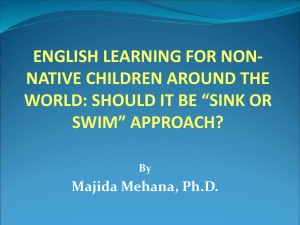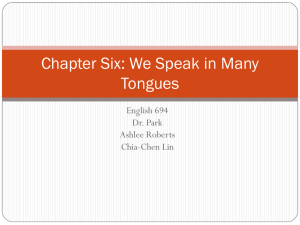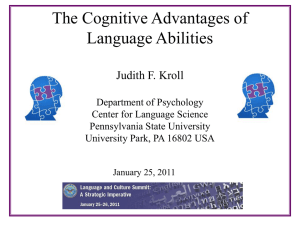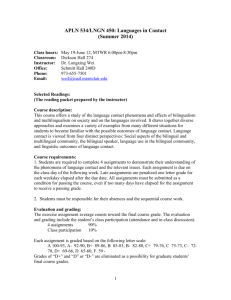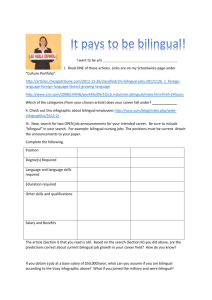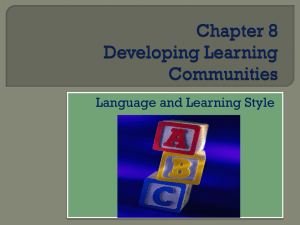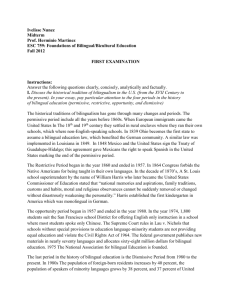Module 1 Bilingual Education Provides Mental Health
advertisement
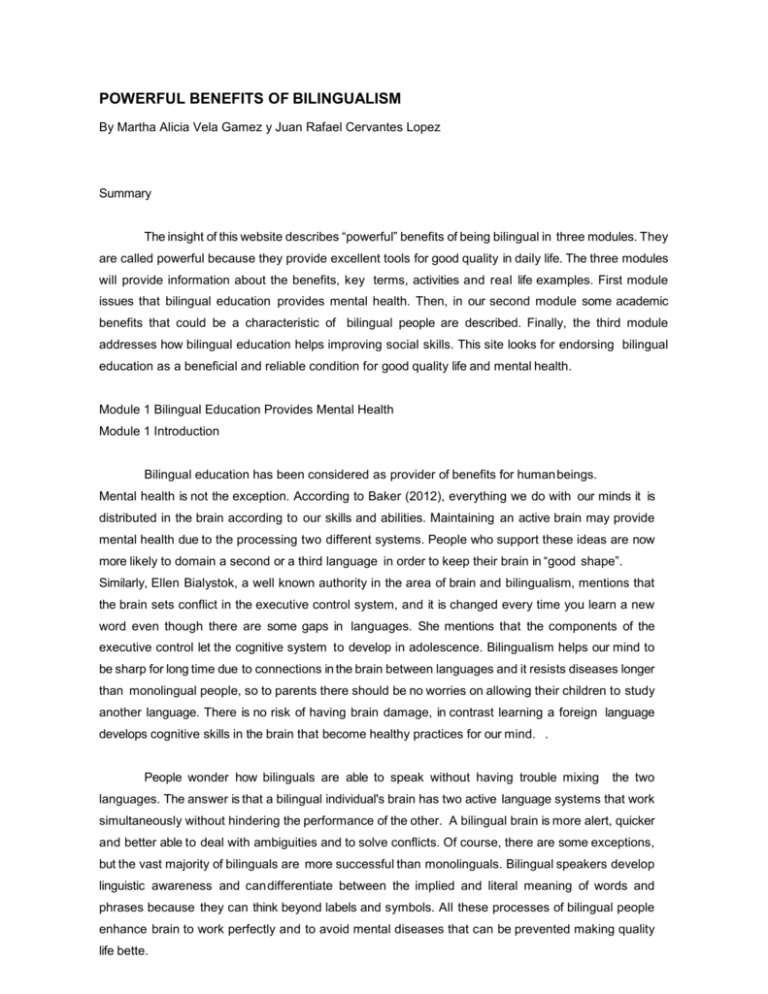
POWERFUL BENEFITS OF BILINGUALISM By Martha Alicia Vela Gamez y Juan Rafael Cervantes Lopez Summary The insight of this website describes “powerful” benefits of being bilingual in three modules. They are called powerful because they provide excellent tools for good quality in daily life. The three modules will provide information about the benefits, key terms, activities and real life examples. First module issues that bilingual education provides mental health. Then, in our second module some academic benefits that could be a characteristic of bilingual people are described. Finally, the third module addresses how bilingual education helps improving social skills. This site looks for endorsing bilingual education as a beneficial and reliable condition for good quality life and mental health. Module 1 Bilingual Education Provides Mental Health Module 1 Introduction Bilingual education has been considered as provider of benefits for human beings. Mental health is not the exception. According to Baker (2012), everything we do with our minds it is distributed in the brain according to our skills and abilities. Maintaining an active brain may provide mental health due to the processing two different systems. People who support these ideas are now more likely to domain a second or a third language in order to keep their brain in “good shape”. Similarly, Ellen Bialystok, a well known authority in the area of brain and bilingualism, mentions that the brain sets conflict in the executive control system, and it is changed every time you learn a new word even though there are some gaps in languages. She mentions that the components of the executive control let the cognitive system to develop in adolescence. Bilingualism helps our mind to be sharp for long time due to connections in the brain between languages and it resists diseases longer than monolingual people, so to parents there should be no worries on allowing their children to study another language. There is no risk of having brain damage, in contrast learning a foreign language develops cognitive skills in the brain that become healthy practices for our mind. . People wonder how bilinguals are able to speak without having trouble mixing the two languages. The answer is that a bilingual individual's brain has two active language systems that work simultaneously without hindering the performance of the other. A bilingual brain is more alert, quicker and better able to deal with ambiguities and to solve conflicts. Of course, there are some exceptions, but the vast majority of bilinguals are more successful than monolinguals. Bilingual speakers develop linguistic awareness and can differentiate between the implied and literal meaning of words and phrases because they can think beyond labels and symbols. All these processes of bilingual people enhance brain to work perfectly and to avoid mental diseases that can be prevented making quality life bette. These days, more people are aware of the great power of an active mind. Physicians usually recommend people to study languages and children who grew bilingual are demonstrating that the recent research was not wrong. For both children and adults Bilingualism turns into a lifestyle but also as a mean for mental health. We have to reinforce the idea that “healthy mind leaves illnesses behind” and offer bilingual education as something beneficial for people´s health. Module 1 Goal The aim of this module is to provide relevant information about the benefits of bilingualism on mental health. Module 1 Objectives 1. Characterize the features of good brain health. 2. Describe the functions occurring in the brain of a bilingual person. 3. Emphasize bilingual learning as good means of quality life. Module 1 Activities 1. Read the following article about bilingualism and mental health, it shares good data about the topic. According to the article, new research explains how speaking more than one language may translate to better mental health. Scientists examine how being bilingual can offer protection from the symptoms of dementia, and also suggests that the increasingdiversity in our world populations may have an unexpected positive impact on the resiliency of the adult brain. retrieved from: http://www.sciencedaily.com/releases/2012/03/120329124603.htm 2. Watch the following video that describes how bilingualism helps to have a sharp mind, and it also delays Alzheimer´s disease, which was found in monolinguals and bilinguals, but bilingual people did not showed any symptoms for a long period of time, retrievedfrom: http://www.cbc.ca/player/News/TV+Shows/The+National/Canada/ID/2153313906/ 3. The following article mentions that it is showed that speaking a second language may delay the onset of three types of dementia. The research is an online issue of Neurology, the medical journal of the American Academy of Neurology. retrieved from: https://www.aan.com/pressroom/home/pressrelease/1219 Module 1 Support Sources 1. A research based on bilingual children outperform children who speak only one language in problem-solving skills and creative thinking, http://www.sciencedaily.com/releases/2012/08/120803082915.htm retrieved from: 2. A BBC news report about how speaking a second language may delay dementia, retrieved from: http://www.bbc.com/news/uk-scotland-edinburgh-east-fife-24836837 3. An article published by The New York Times about the benefits of bilingualism, retrieved from: http://www.nytimes.com/2012/03/18/opinion/sunday/the-benefits-of-bilingua lism.html 4. A Time Magazine article about how the brain benefits from being bilingual, retrieved from: http://science.time.com/2013/07/18/how-the-brain-benefits-from-being-bilingual/ 5. A published article about The Bilingual Brain Proficiency and Age of Acquisition of the Second Language, retrieved from: http://www.lscp.net/persons/dupoux/papers/Perani_PSDDBCFM_1998_Bilingual_brain_pr oficiency_&_age_of_acquisition.Brain.pdf 6. A Nature Publishing Group article about the structural plasticity in the bilingual brain, retrieved from: http://faculty.washington.edu/losterho/mechelli_ l2_vmb.pdf 7. Bialystok´s published article about Reshaping the Mind: The Benefits of Bilingualis m, retrieved from: http://www.apa.org/pubs/journals/features/cep-65-4-229.pdf 8. A Language Magazine article about How to Keep Your Brain Young, retrieved from: http://www.sdkrashen.com/content/articles/keeping_your_brain_young.pdf 9. Website about Supporting Mental Health in Ireland, retrieved from: http://www.mentalhealthireland.ie/information/what-is-menta l-health.html 10. Website article about How Bilingualism is Good for Your Mental Health, retrieved from: http://www.languageonthemove.com/language-migration-social-justice/bilingualism-isyour-mental-health Module 1 References About Alzheimer. Alzheimer Foundation of America. http://www.alzfdn.org/AboutAlzheimers/definition.html Retrieved from good-for- Baker, C. (2011). Foundations of bilingual education and bilingualism (5th. Ed.). Bristol, UK: Multilingual Matters, Inc. Bhattacharjee, Y. (2012, March 17). Why bilinguals are smarter. The New York Times. Retrieved from http://www.nytimes.com/2012/03/18/opinion/sunday/the-benefits-of- bilingualism.html Bialystok, E. (2011). Reshaping the mind: The benefits of bilingualism. Canadian Journal of Experimental Psychology. Canadian Psychological Association. Retrieved from http://www.apa.org/pubs/journals/features/cep-65-4-229.pdf Bialystok. E. (2012, April). Bilingualism: consequences for mind and brain.Cell Press. Retrieved fromhttp://www.cell.com/trends/cognitivesciences/abstract/S13646613(12)000563?%20%2 0_returnURL=http%3A%2F%2Flinkinghub.elsevier.com%2Fretrieve%2Fpii%2FS1364663 12000563%3Fshowall%3Dtrue Gallagher, J. (2013, October 10). Alzheimer's breakthrough: Cure or hype? BBC News Health. Retrieved from http://www.bbc.com/news/health-24478942 Kluger, J. (2013, July 18). How the brain benefits from being bilingual. Time Magazine. Retrieved from http://science.time.com/2013/07/18/how-the-brain-benefits-from-being-bilingua l/ MacGil, M. (2014, October 29) What is dementia? The signs, symptoms and causes of dementia. MNT Knowledge Center. Retrieved from http://www.medicalnewstoday.com/articles/142214.php Speaking a second language may delay dementia. (2013, November 7). BBC NEWS Edinburgh, Fife and East Scotland. Retrieved from http://www.bbc.com/news/uk-scotland-edinburgh-eastfife-24836837 Structural plasticity in the bilingual brain. Proficiency in a second language and age at acquisition affect grey-matter density. (2004, October 14). Nature Publishing Group. Vol 431. Retrieved from http://faculty.washington.edu/losterho/mechelli_ l2_vmb.pdf Module 2 Bilingual Education Supports Better Academic Achieve me nt Module 2 Module 2 Introduction Academic achievement depends on several circumstances. Bilingualism can be one of those circumstances due to the brain activities and abilities that it develops. According to the National Center for Educational Statistics, some of the advantages after bilingualism that have a positive influence on academic achievement are: being able to learn new words easily, putting words into categories, being able to use information in new ways, coming up with solutions to problems and good listening skills. All these ideas support Bialystok’s contributions on the advantages of being bilingual. Similarly, Victoria Marian, and Anthony Shook (2012), cognitive benefits of bilingualism extend from childhood to old age as the brain more efficiently process information and staves off cognitive decline. Research has overwhelmingly shown that when a bilingual person uses one language, the other is active at the same time. When a person hears a word, he or she doesn't hear the entire word all at once: the sounds arrive in sequential order. Long before the word is finished, the brain’s language system begins to guess what that word might be by activating lots of words that match the signal. When studying, it is important that students recognize many words and learn how to use them effectively in different contexts. Also, organizing words and information into categories helps students to use the information effectively and to have clearer ideas. Because both of a bilingual person’s language systems are always active and competing, that person uses these control mechanisms every time she or he speaks or listens. Bilingual people often perform better on tasks that require conflict management. Bilingual people usually have a quick and clear solution to routine situations, including the classic debates, discussions and talks presented in school classrooms at any level. These days education is presented in a way that students must be able to solve problems. Bilingual people usually show off good problem solving. It might be for the reason that information in a bilingual person is commonly clearer and better organized. Sometimes time for solving problems is crucial and bilingual people are usually that lively so they appear with reasonsfor defending a point so easily, including academic tasks presented in daily school life. Listening skills are also enhanced, due to the good recognition of words that comes after a person is well trained and aware of the different languages she or he knows. These days, people are usually looking for answers related to their academic achievement´s success or failure. Considering the benefits after bilingualism would enhance your decision toward becoming bilingual or not. In a global world, Bilingualism offers skills and solutions in our daily lives, including academic issues. Module 2 Goal The aim of this module is to mention some features in which bilingual education improves academic achievement. Module 2 Objectives 1. Characterize some of the tools from bilingualism that enhance academic achievement 2.Describe the academic abilities obtained after bilingualism 3.Emphasize the advantages of bilingualism on academic achievement Module 2 Activities 1. Watch these videos and reflect about how much we care for our children´s education, retrieved from https://www.youtube.com/watch?v=ZNS4Z9i1O4E https://www.youtube.com/watch?v=Z5u6EMhjf7s 2. Read this article about the effect of bilingualism on school achievement, retrieved from http://www.ciil-ebooks.net/html/bilingualism/part%201.htm 3. Read this article about Bilingualism and the Academic Performance of Mexican American Children: The Evolving Debate, retrieved from http://www.ericdigests.org/pre-9217/academic.htm Module 2 Support Sources 1. A Book chapter about how Bilingual Two-Way Immersion Programs Benefit Academic Achievement, retrieved from http://www.bilingualism.northwestern.edu/bilingualismpsycholinguistics/files/MarianetalImmersionEd ucation.pdf 2. A research of The Effects of Bilingual and ESL Programs on Academic Achievement of English Language Learners, retrieved from http://www.hhh.umn.edu/centers/rwc/conferences/fourth/pdf/Paper_BilingualandESLonAc ademicAchievement_Sep2012.pdf 3. This research aims to formulate the best way to increase achievement levels, academic and social, for students once seen as a disadvantaged population by effectively teaching students to live and learn among the dominant culture, retrieved from https://www.msu.edu/~spannjam/Entire%20Paper.htm 4. A website that shows the Effect of Bilingualism on School Achievement, retrieved from http://www.ciil-ebooks.net/html/bilingualism/part%201.htm 5. A Bilingual Two-Way Immersion Programs Benefit Academic Achievement , retrieved from http://webcache.googleusercontent.com/searchq=cache:XU1TINSIzfIJ:xa.yimg.com/kq/gro ups/27707144/1036784366/name/Module%2B8%2BdeJong.pdf+&cd=1&hl=es-419&ct=clnk&gl=mx 6. This paper proposes a comprehensive framework for defining success in bilingual education, retrieved from http://www.brown.edu/academics/education-alliance/sites/brown.edu.academics.educationalliance/files/publications/Defining_Success.pdf 7. Bilingual Education website, retrieved from http://www.nabe.org/BilingualEducation 8. An article that points out beliefs about the intrinsic value of English as a language of instruction and learning, retrieved from https://www.academia.edu/7857507/Academic_achievement_underachievement_and_bilingual_mul tilingual_education_What_the_university_can_con tribute 9. A chapter from an e- book Cognitive Development and Academic Achievement : A Study of African american, Caucasian, and Latino children, retrieved from http://books.google.com.mx/booksid=bAvzq8uWt1cC&pg=PA24&lpg=PA24&dq=academ ic+achievement+in+bilingualism&source=bl&ots=FdiiyYXbAA&sig=vYfLUYZs4DLpB5 rewm9AhSUty94&hl=es419&sa=X&ei=unBZVOWnHIeyATKooLQAQ&ved=0CBoQ6A EwADge#v=onepage&q=academic%20achievement%20in%20bilingualism&f=false 10. A National Study of School Effectiveness for Language Minority Students in Long- Term Academic Achievement, retrieved from http://www.usc.edu/dept/education/CMMR/CollierThomasComplete.pdf Module 2 References Bilingual education. NABE. Retrieved from http://www.nabe.org/BilingualEducation Brisk, M.(1999, November). Quality bilingual education defining success. Retrieved from http://www.brown.edu/academics/education-alliance/sites/brown.edu.academics.educationalliance/files/publications/Defining_Success.pdf Effect of bilingualism on achievement in school. Bilingualisn and Achivement in School. Retrieved from http://www.ciil-ebooks.net/html/bilingualism/part%201.htm Garcia, E. (1990, September). Performance of mexican-american children: The evolving debate. Eric Digest. Retrieved from http://www.ericdigests.org/pre-9217/academic.htm Jong, E. Effective bilingual education: from theory to academic achievement in a two-way bilingual program. Retrieved from http://webcache.googleusercontent.com/search?q=cache:XU1TINSIzfIJ:xa.yimg.com/kq/gr oups/27707144/1036784366/name/Module%2B8%2BdeJong.pdf+&cd=1&hl=es419&ct=cln k&gl=mx Marian, V., Z Shook, A. (2012, October 31). The cognitive benefits of being bilingual. Retrieved from https://dana.org/Cerebrum/2012/The_Cognitive_Benefits_of_Being_Bilingual/ Thomas, W., Z Collier, V. (2001, June 30). A national study of school effectiveness for language minority students in long-term academic achievement. Retrieved from http://www.usc.edu/dept/education/CMMR/CollierThomasComplete.pdf Spann, J., Z Gold, S. The relationship between effective bilingual education programs and academic achievement for latino students. Retrieved from https://www.msu.edu/~spannjam/Entire%20Paper.htm Sweetnam, M. Academic achievement, underachievement and bilingual/multilingual education: What the university can contribute. Retrieved from https://www.academia.edu/7857507/Academic_achievement_underachievement_and_bilin gual_multilingual_education_What_the_university_can_contribute Viorica, M. (2013). Bilingual two-way immersion programs benefit academic achievement. Retrievedfrom http://www.bilingualism.northwestern.edu/bilingualismpsycholinguistics/files/MarianetalI mmersionEducation.pdf Module 3 Bilingualism Enhances Social Skills Module 3 Introduction Bilingualism has several positive effects on a bilingual person´s life. In recent years, many studies led to the conclusion that bilinguals have greater social sensitivity. This social sensitivity is so significant for a person´s life due to the importance of interpersonal relations in today´s society. Some of the authors who stand for these ideas are Ellen Byalstok and Francois Grosjean, who are lucid supporters of the benefits of bilingualism in daily life. With good social and cultural skills, says Grosjean, bilinguals adapt their attitudes, behaviors, and values to other cultures and combine and blend aspects of the cultures involved. Also, according to Grosjean, recent research shows that bilinguals are characterized with greater social relations, creativity and professional success. The main social situations in which benefits from bilingualism influence a person´s life are: access to other cultures, better job opportunities and constructive interpersonal relationships. Referring to the latter, bilingual adults and children seem to have other social and emotional benefits like being able to internalize negative states like anxiety, aggression, anger, loneliness or low selfesteem less frequently. It seems likely that bilinguals would be more tolerant of differences and more open to diversity. Bilingualism then is not a phenomenon that occurs only as a mental process. In contrast, it has a big social impact and makes individuals more open to share and accept new ideas. All these are some of the social skills acquired within bilingualism. They all are important because they face several aspects of social life. If being bilingual leads to all these benefits then it may be something that should be promoted and studied. Imagine the results for a person if she or he is good to access to other cultures, has skills for hunting good jobs, and has good relationship with other. This person may have a lot of advantages for survival in today´s society demands. In conclusion, social behavior of a person can be positively influenced by bilingualism. By being able to communicate in two languages, you are free to learn about diverse cultures, traditions and social behaviors as well as be a part of them. People who speak two languages have two windows open to the world to enrich their life. Being bilingual makes it is easier to travel, find a job and belong to this new global world inside and outside of your country. Bilinguals also behave well socially so they become cosmopolitan citizens in this global society, something that is essential to grow as a professional and as a person. Module 3 Goal Module 3 goal is to endorse the importance of the positive impact of bilingualism on people´s social behaviors and interpersonal relationships. Module 3 Objectives 1. 2. Characterize the benefits of bilingualism on people´s social behaviors. Describe the social situations in which bilingualism has a positive influence and models a person´s social performance. 3.Emphasize the relevance of bilingualism for people to perform better at relationships. interpersonal Module 3 Activities 1. Watch this video of the great social relevance of bilinguals. This can make you aware of the social impact and help you make up your mind and learn a new language, retrieved from https://www.youtube.com/watch?v=VN6Lz-RC7sg 2. Read the Interview on Bilingualism with Professor Francois Grosjean. Among some other things, you can get from his answers, the relevance of bilingualism in someone´s social life, retrieved from http://www.francoisgrosjean.ch/interview_en.html 3. Watch this video which is like a movie trailer that points out the social effect of being bilingual in today´s society, retrieved from https://www.youtube.com/watch?v=LUmtBmg-akQ Module 3 Support Sources 1.A website from New Zeland that shares the experience of bilingualism in an elementary school by its principal, retrieved from http://www.bilingualednz.co.nz/benefits.html 2 .A web article that explains the benefits of being bilingual and why is it important to learn a second language, retrieved from http://voxxi.com/2013/09/20/benefits-of-be ing- bilingual-why-we-shouldlearn-a-second-language/ 3 A research on how bilingualism and social intelligence are generating considerable interest in terms of their vital applications in today’s modernized world, retrieved from http://www.ijllalw.org/finalversion722.pdf 4. An encyclopedia that addresses bilingualism and sensitivity in communication, retrieved from http://books.google.com.mx/books? id=YgtSqB9oqDIC&pg=PA57&lpg=PA57&dq=social +skills+and+bilingualism&source=bl&ots=1iBTU6Dj37&sig=B34tCvZguNCpzjoX6125cYDreE&hl=en &sa=X&ei=CqRmVOWYMMWSyATx3oDoDg&ved=0CC8Q6AEwAzgK#v=onepage&q=social%20ski lls%20and%20bilingualism&f=false 5. Francois Grosjean´s blog "Life as a bilingual" posts by content area, retrieved from http://www.francoisgrosjean.ch/blog_en.html 6. A book chapter in bilingualism and cognitive development in three perspectives that mention how a bilingual person develops social kills, retrieved from http://web.stanford.edu/~hakuta/www/research/publications/(1987)%20%20BILINGUALISM%20AND%20COGNITIVE%20DEVELOPMENT%20THREE%20 PERSPE.pdf 7. A psychology today website article that shares data about the reality of living with two languages, retrieved from http://m.psychologytoday.com/blog/life-bilingual/201106/what- are-the-effects- bilingualism 8- The American- Speech- Language- Hearing Association website that show the advantages of being bilingual, retrieved from http://www.asha.org/public/speech/development/The-Advantages-of-Being-Bilingua l/ 9- A paper that stands the author´s understanding in the way how bilingualism influences children, particularly, their conversational skills, retrieved from http://www.academia.edu/609468/Influence_of_Bilingualism_on_Children_s_Conversatio nal_Skills 10.A website from Language Enhancing the Achievement of Pasifika which mentions the advantages of bilingualism, among those a communicative sensitivity section, retrieved from http://leap.tki.org.nz/Is-bilingualism-an-advantage Module 3 References Abbasian, G.R., & Merati, H. (2014, October). Bilingualism is on merit: Social intelligence augmentation. International Journal of Language Learning and Applied Linguistics World, Volume 7 (2), 16-26. Retrieved from http://www.ijllalw.org/finalversion722.pdf Bilingualism and cognitive development: three perspectives. Retrieved from http://web.stanford.edu/~hakuta/www/research/publications/(1987)%20%20BILINGUALISM%20AND%20COGNITIVE%20DEVELOPMENT%20THREE%20 PERSPE.pdf Bilingual Education, New Zeland. Retrieved from http://www.bilingualednz.co.nz/benefits.html Baker, C. Z Prys. J. S. Encyclopedia of bilingualism and bilingua l education. Retrieved from http://books.google.com.mx/books?id=YgtSqB9oqDIC&pg=PA57&lpg=PA57&dq=social +skills+and+bilingualism&source=bl&ots=1iBTU6Dj37&sig=B34tCvZguNCpzjoX6125cYDreE &hl=en&sa=X&ei=CqRmVOWYMMWSyATx3oDoDg&ved=0CC8Q6AEwAzgK#v=onepage& q=social%20skills%20and%20bilingualism&f=false De Miguel, V. (2013, September 20). Benefits of being bilingual: Why we should learn a second language. Retrieved from http://voxxi.com/2013/09/20/benefits-of-be ing-bilingual- François Grosjean's Psychology Today blog: Life as a bilingual. Retrieved from http://www.francoisgrosjean.ch/blog_en.htm Grosjean, F. Life as a bilingual. The reality of living with two (or more) languages.Retrieved from http://m.psychologytoday.com/blog/life-bilingual/201106/what-are-the-effects- bilingualism Is bilingualism an advantage? Retrieved from http://leap.tki.org.nz/Is-bilingualism-an- advantage Mohd, M. (2011, May 2). Influence of bilingualism on children´s conversational skills. Retrieved from http://www.academia.edu/609468/Influence_of_Bilingualism_on_Children_s_Conversatio nal_Skills The Advantages of Being Bilingual. The American-Seach-Language-hearing Association. Retrieved from http://www.asha.org/public/speech/development/The-Advantages-of-BeingBilingual
